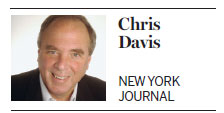
One of the two American scientists receiving the prestigious International Science and Technology Cooperation Award - China's highest honor in science for foreigners - in Beijing last week says it caught him completely off guard.
Peter Stang, distinguished professor of chemistry and former dean of science at the University of Utah, told Xinhua he was "very surprised and greatly honored" to receive the award. "I did not at all expect this very special recognition," he said.
Stang's collaborations with Chinese chemists originated from a visit to the Institute of Chemistry the Chinese Academy of Sciences in Beijing in 2004 , where he discovered that they "had expertise that we did not have but would be very interesting to apply in our research," he recalled.
The compounds he works with are called self-assembled large complex molecules.
"They are interesting in themselves and the way they form," Sang explained, but their potential is what makes them special. "They have applications as sensors, for example, we have used them to detect explosives like TNT. They have anti-cancer activity, although in a very preliminary stage," in mice, so far.

They also have been used in optoelectronics as materials for oleds, solid-state devices that produce light when electricity is applied.
Since 2004, Stang's involvement with Chinese colleagues has evolved into collaborations that take him to China two-to-three times a year. "And it has elaborated into collaborations with other institutions and universities," he told China Daily. He has visiting faculty appointments at a dozen Chinese universities and institutions.
"I don't speak Chinese; I should learn," he said. "Science is international and the language of science is English, so they know English very well."
Stang described last week's awards ceremony at the Great Hall of the People in Beijing.
"I shook hands with the president, which was very exciting, because I have also had the opportunity to shake hands with President Obama in 2011 when I got the US National Medal of Science - roughly the equivalent of this award. So I've now had the opportunity to shake hands with the leaders of the two most important countries in the world," he said. "Not bad."
Stang, an organic chemist, has been at the University of Utah since 1969. He did his undergraduate work at DePaul University in Chicago, got his PhD at UC Berkeley and did post-doctorate work at Princeton. He is a member of the US National Academy of Sciences, the American Academy of Arts and Sciences and a foreign member of the Chinese Academy of Sciences. He was born in Germany in 1941 and left "at a very, very early age."
Noting that he likes Chinese culture, Chinese history, Chinese people and Chinese food, Stang said, "I have many excellent visiting scholars and postdoctoral fellows from China. In fact, my current research group of 10 people has seven researchers from China."
He called China's investment in science and technology a "wise" decision because it's very important for the future.
"I hope China will continue to strongly support science and technology," Stang said. "Future economic wellbeing and the health and wealth of people all over the world depend on new discoveries and developments in science and technology."
A total of seven foreign scientists received an International Cooperation Award in Science and Technology at this year's ceremony.
Besides Stang and the other American honored - Walter Ian Lipkin, director of the Center for Infection and Immunity at Columbia University's Mailman School of Public Health - the five other recipients were Jan-Christer Janson from Sweden, Kazuki Okimura from Japan, Evgeny Velikhov from Russia, Carlo Rubbia from Italy and Joannes E. Frencken from the Netherlands.
Since 1995, China has given the award to 101 foreign scientists and two international organizations.
Contact the writer at chrisdavis@chinadailyusa.com.